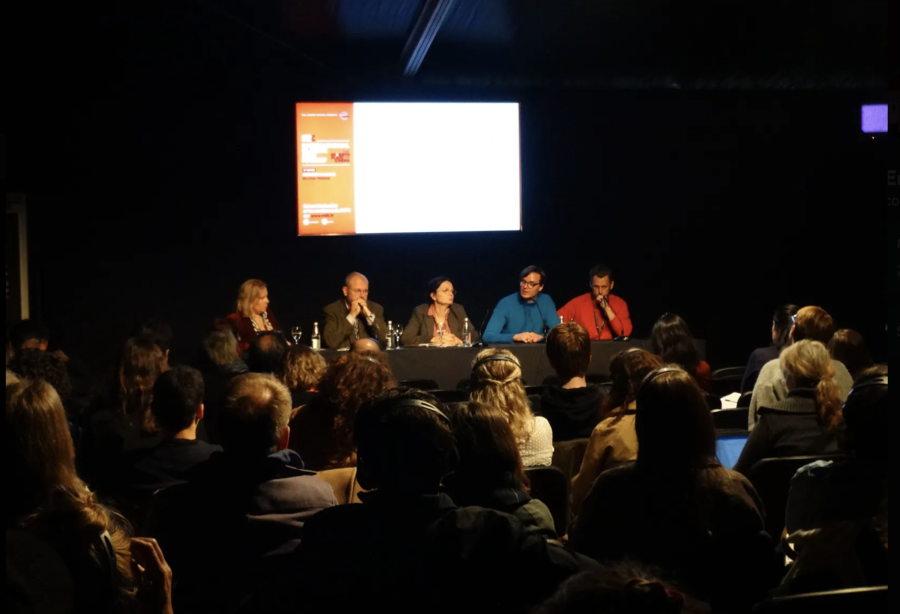New European Programme AgoraEU: what does the future hold for the classic film industry?
On its first day, the International Classic Film Market examined the European AgoraEU program and the controversies it raises, particularly with regard to heritage cinema, during a round table discussion moderated by Melanie Goodfellow, Senior International Film Correspondent for Deadline. The panel included Michal Bregant, president of the Association of European Cinematheques, Sebastian Naumann, Managing director of the CICAE, Juliette Prissard, General Delegate of EUROCINEMA, and Jan de Vries, Creative director and Programmer at the KINO Rotterdam.

The round table began with a video from MEP Emma Rafowicz, who is also Vice-Chair of the Parliament's Committee on Culture and rapporteur for Creative Europe. She wanted to clarify the political scope of AgoraEU, warning of the risk of dilution posed by the integration of Media, a specific aid fund, into a broader program, Media+, particularly for independent cinema and co-production, which are not clearly specified in the new text. She intends to defend this risk in Parliament, asserting that AgoraEU is “at the heart of a cultural battle.” You can find her video on the round table replay here (with your accredited codes, available on your Festiciné space).
AgoraEU, a new program “at the heart of a cultural battle”
Describing AgoraEU as a tool of resistance as well as offense that must be used against reactionaries, Emma Rafowicz sided with Michal Bergant, who believes that AgoraEU's political mission is hampered by the Media+ component. For the president of the European Film Archives Association, archive cinema promotes critical thinking and democratic values. But without adequate funding, there can be no accessible archive cinema. Negotiations are therefore crucial before Media+ is implemented for the period 2028-2034.
A major issue: the budget
At the heart of the launch of AgoraEU is the question of its budget, which mixes the audiovisual sectors. Previously dependent on a specific fund, cinema will soon be mixed with the news media within Media+. This is a significant obstacle to the financial assurances demanded by professionals, as Juliette Prissard explained. Indeed, while Media is the only European fund that finances cinema, the lack of separation between the different sectors threatens the film industry, which needs its independence to be enshrined in the final text. Given the current belligerent political climate in Europe, how can we be sure that the news media will not be favored over cinema, and in particular heritage cinema, when it comes to allocating funds? Furthermore, Michal Bregant lamented the fact that heritage cinema is not specifically mentioned in the AgoraEU text, further weakening the sector within this upcoming budget. Finally, the vote on the latter is just as thorny, because, as Juliette Prissard explained, while the text currently provides a certain degree of security regarding the funding allocated to the heritage sector, with Media+ and its new voting procedures, these assurances will disappear and funding may change from one year to the next.
The limitations of such a program
In addition to the issues that are still under negotiation, the introduction of AgoraEU and Media+ raises several limitations highlighted by the participants in this round table discussion. First, according to Michal Bregant, there is the threat to international cooperation and the fact that the budget voting deadlines are too close together to keep up with the pace of traditional cinema. Juliette Prissard also raised the issue of the possibility of funding non-European companies.
So what avenues can be explored to move the negotiations forward?
In light of the many points raised by the participants in this round table discussion, a number of ideas have emerged to successfully amending the text before it comes into force in 2028. To this end, Juliette Prissard asked the various panelists not to hesitate to challenge their MEPs in Parliament, arguing that too few of them are currently fighting against AgoraEu. At the same time, she called for greater certainty in the final text regarding funding for cinema, and in particular for heritage cinema. The establishment of a lobby was also mentioned by Michal Bregant, while Sebastian Naumann and Jan de Vries highlighted several concrete issues affecting workers in the heritage sector that should be taken into account during negotiations. These included access to material that falls within the scope of international cooperation. He would like to see this made available regardless of borders, particularly with regard to subtitles, and insisted on the need to redefine what heritage cinema is in order to attract new audiences. For his part, Michal Bregant suggested turning to new audiences, namely senior citizens, who represent an opportunity that should not be missed in order to develop classic cinema. These points could be raised between now and 2028 and the implementation of Media+.




